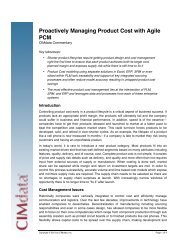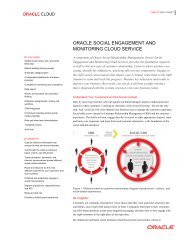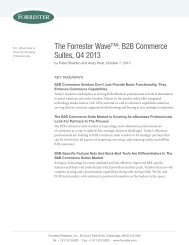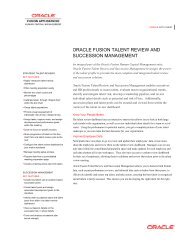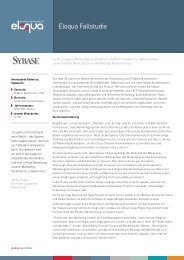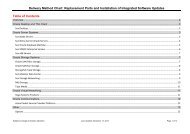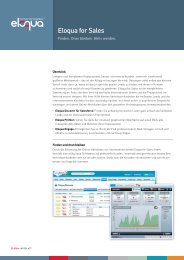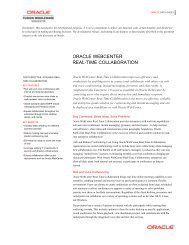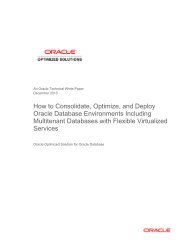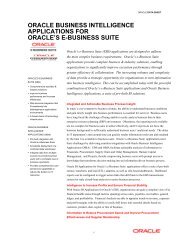Oracle Single Client Access Name (SCAN)
Oracle Single Client Access Name (SCAN)
Oracle Single Client Access Name (SCAN)
You also want an ePaper? Increase the reach of your titles
YUMPU automatically turns print PDFs into web optimized ePapers that Google loves.
<strong>Oracle</strong> <strong>Single</strong> <strong>Client</strong> <strong>Access</strong> <strong>Name</strong> (<strong>SCAN</strong>)<br />
First nslookup<br />
[oracle@mynode] nslookup sales1-scan<br />
Server: 131.32.249.41<br />
Address: 131.32.249.41#53<br />
Second nslookup<br />
[oracle@mynode] nslookup sales1-scan<br />
Server: 131.32.249.41<br />
Address: 131.32.249.41#53<br />
Non-authoritative answer:<br />
Non-authoritative answer:<br />
<strong>Name</strong>: sales1-scan.example.com<br />
<strong>Name</strong>: sales1-scan.example.com<br />
Address: 133.22.67.192<br />
Address: 133.22.67.193<br />
<strong>Name</strong>: sales1-scan.example.com<br />
<strong>Name</strong>: sales1-scan.example.com<br />
Address: 133.22.67.193<br />
Address: 133.22.67.194<br />
<strong>Name</strong>: sales1-scan.example.com<br />
<strong>Name</strong>: sales1-scan.example.com<br />
Address: 133.22.67.194<br />
Address: 133.22.67.192<br />
Example 3: Look up the <strong>SCAN</strong> configuration in DNS using “nslookup”<br />
Note: If your DNS server does not return a set of three IPs as shown in figure 3 or does not roundrobin,<br />
ask your network administrator to enable such a setup. Round-robin on DNS level allows for<br />
a connection request load balancing across <strong>SCAN</strong> listeners floating in the cluster. It is not required<br />
for <strong>SCAN</strong> to function as a whole and the absence of such a setup will not prevent the failover of a<br />
connection request to another <strong>SCAN</strong> listener, in case the first <strong>SCAN</strong> listener in the list is down.<br />
The <strong>Oracle</strong> <strong>Client</strong> typically handles failover of connections requests across <strong>SCAN</strong> listeners in the<br />
cluster. <strong>Oracle</strong> <strong>Client</strong>s of version <strong>Oracle</strong> Database 11g Release 2 or higher will not require any<br />
special configuration to provide this type of failover. Older clients require considering additional<br />
configuration 1 . It is therefore recommended that the minimum version of the client used to<br />
connect to a database using <strong>SCAN</strong> is of version <strong>Oracle</strong> Database 11g Release 2 or higher.<br />
Using client-side DNS caching may generate a false impression that DNS round-robin is not occurring<br />
from the DNS server. (DNS not return a set of three IPs as shown in figure 3). <strong>Client</strong>-side DNS<br />
caches are typically used to minimize DNS requests to an external DNS server as well as to minimize<br />
DNS resolution time. This is a simple recursive DNS server with local items.<br />
If the client-side DNS cannot be set up to provide round-robin locally or cannot be disabled, <strong>Oracle</strong><br />
<strong>Client</strong>s using a JDBC:thin connect will typically attempt a connection to the <strong>SCAN</strong>-IP and <strong>SCAN</strong>listener<br />
which is returned first in the list. This basically disables the connection request load balancing<br />
across <strong>SCAN</strong> listeners in the cluster from those clients, but does not affect <strong>SCAN</strong> functionality as a<br />
whole. <strong>Oracle</strong> Call Interface (OCI) based database access drivers will apply an internal round-robin<br />
algorithm and do not need to be considered in this case.<br />
1 See <strong>Oracle</strong> <strong>Client</strong> and <strong>Oracle</strong> Database Version Compatibility for <strong>SCAN</strong> in this paper for more information.<br />
3




